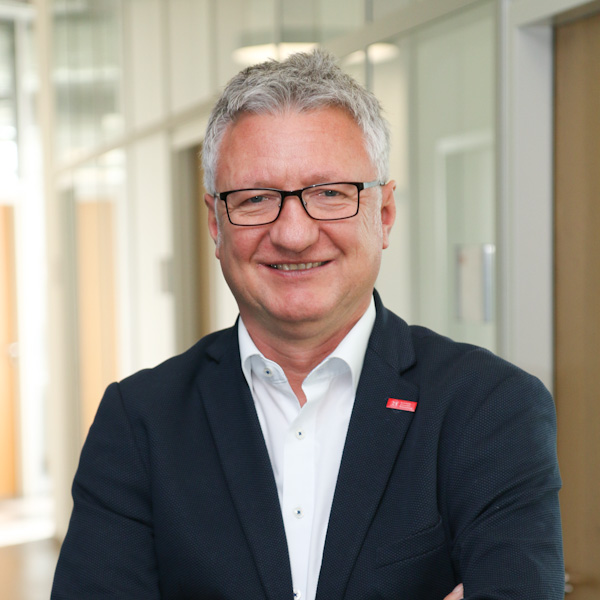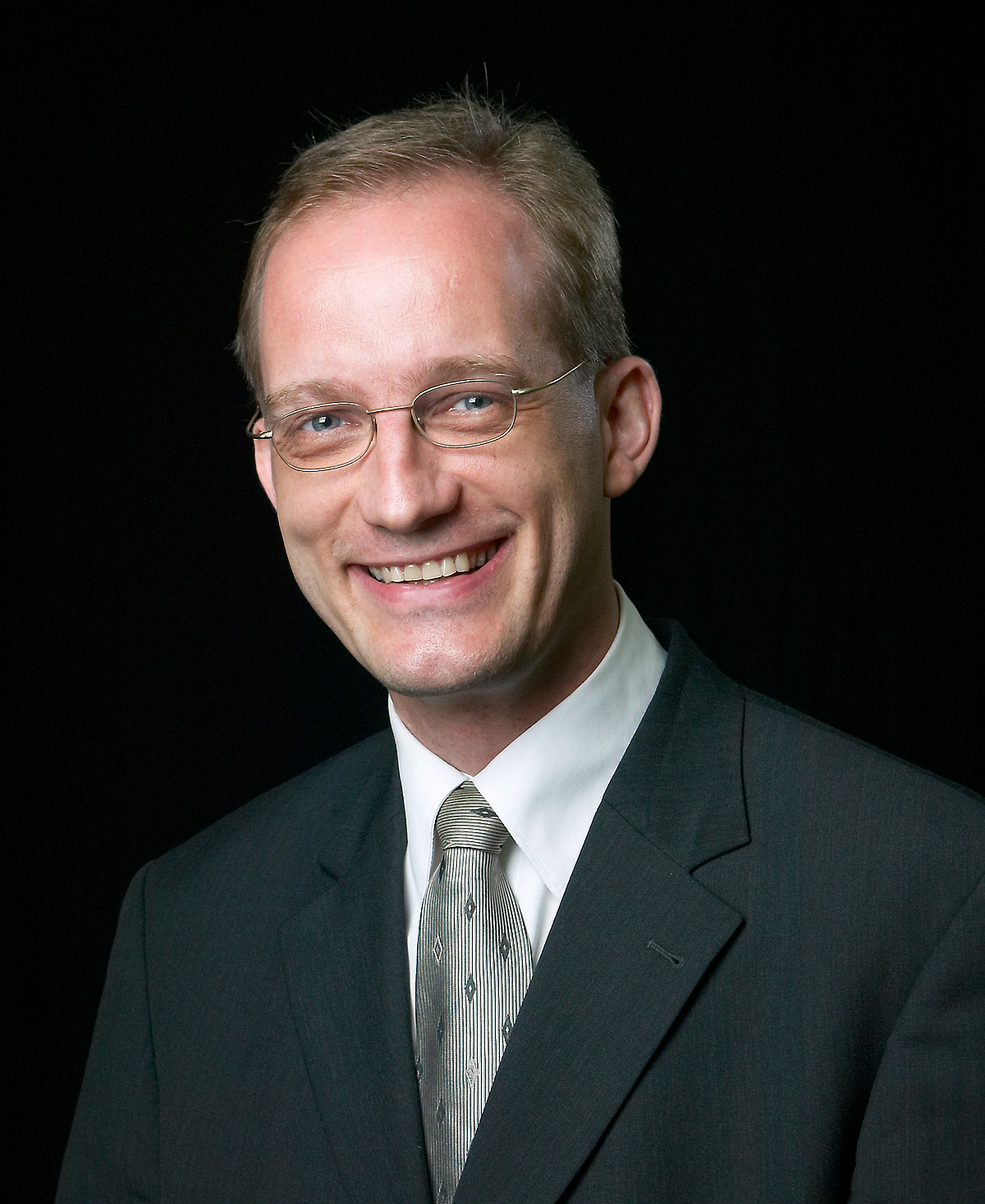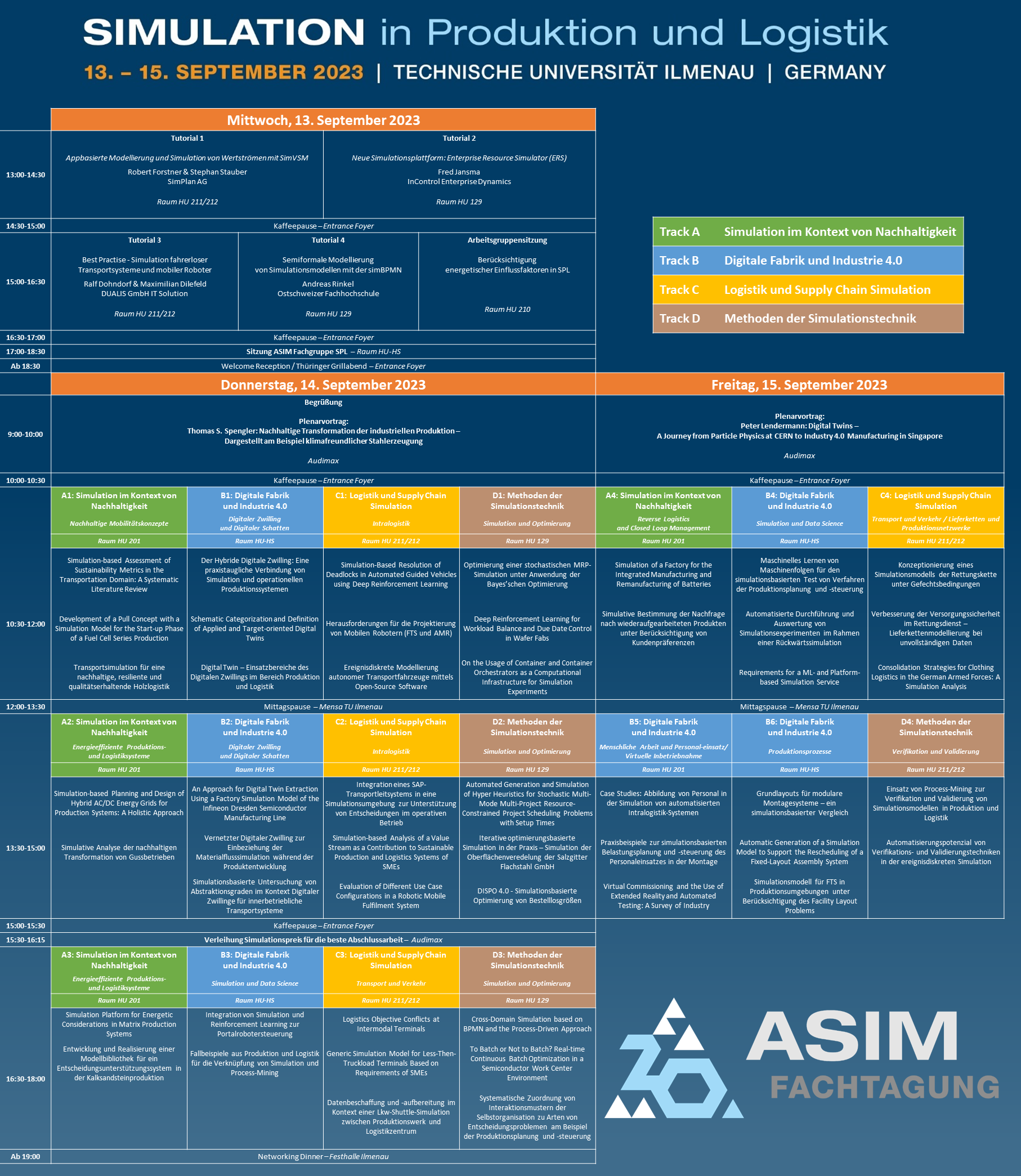Program
Program
In addition, you can download a printable overview of the conference program below.
To enlarge/download please click on the image.
Keynote 1: Thomas S. Spengler (Technische Universität Braunschweig)
Thursday, 14.09.2023 at 9:15 a.m.
Sustainable transformation of industrial production - illustrated by the example of climate-friendly steel productionProf. Dr. Thomas S. SpenglerChair of Production and Logistics; TU Braunschweig |
|
Both the increasingly noticeable effects of climate change and the scarcity of natural resources pose major challenges for our society.
Global production networks and supply chains are also susceptible to disruption. This requires a rethinking with regard to the future design of an ecologically sustainable
and equally economically competitive industrial production. Production decision models for modeling, evaluating and optimizing material and energy flows as well as their
transformation can support management in the strategic planning of a sustainable transformation of their production systems. In this paper, this is illustrated by the example
of the transformation to climate-friendly steel production. Prof. Dr. Thomas S. Spengler holds the Chair of Production and Logistics and is head of the Institute of Automotive Economics and Industrial Production (AIP) at the Technical University of Braunschweig. He studied industrial engineering at the Karlsruhe Institute of Technology (KIT), where he earned a doctorate in economics. In 1998, he was awarded the Venia Legendi for the subject of business administration. He has held numerous leadership positions, such as Vice President for Research and Technology Transfer and Chairman of the Society for Operations Research and of various scientific commissions. Since 2014, he has been an adjunct professor at the University of Rhode Island and a member of the Graduate School of Engineering. In 2020, he was appointed to the Science Council by the President of Germany. His research areas include issues of production and logistics, supply chain management, and sustainability in mobility and industrial production. |
 |
Keynote 2: Peter Lendermann (D-SIMLAB Technologies Ptd Ltd, Singapore)
Friday, 15.09.2023 at 9:15 a.m.
Digital Twins – A Journey from Particle Physics at CERN to Industry 4.0 Manufacturing in SingaporeDr. Peter LendermannD-SIMLAB Technologies Ptd Ltd, Singapore |
|
Digital Twins have become a key element of the ongoing global Industry 4.0 campaign with the objective to speed up digitalization in production and logistics. The potential of the
Digital Twin concept for the enhancement and continuous re-optimization of manufacturing and logistics operations has generally been recognized and accepted in both academia and industry.
However, what a Digital Twin entails and what it should be able to do, or rather what it can be used for, remains controversial to some extent.
In this setting, in my Keynote Presentation I will share some of my own experiences and challenges faced with creating and making use of Digital Twins, starting from my initial involvement
in a neutrino experiment at CERN in Geneva in the early 1990’s, all the way to providing a simulation-enabled Digital Twin framework for multiple application use cases through our
Singapore-headquartered company D-SIMLAB Technologies to help Semiconductor Manufacturing companies worldwide resolve complex challenges around capacity planning and material flow
optimization in semiconductor wafer fabrication facilities. Dr. Peter Lendermann is the Co-Founder and Chief Business Development Officer of D-SIMLAB Technologies, a Singapore-based company providing simulation-based decision support solutions and services to Aviation, Semiconductor Manufacturing and other asset-intensive industries. Prior to this he worked at the Singapore Institute of Manufacturing Technology where he led the research activities related to simulation in production and logistics until spinning them off into D-SIMLAB Technologies. He has been engaged in the simulation community since the early 1990’s when he worked in the CHORUS Collaboration at the European Laboratory for Particle Physics CERN in Geneva (Switzerland) and at Nagoya University (Japan). Peter holds a PhD in Applied High-Energy Physics from Humboldt University in Berlin (Germany) and an MBA in International Economics and Management from SDA Bocconi in Milan (Italy). |
 |
Tutorial 1: Robert Forstner & Stephan Stauber (SimPlan AG)
Wednesday, 13.09.2023 at 13:00-14:30
App-based Modeling and Simulation of Value Streams with SimVSMRobert Forstner & Stephan StauberSimPlan AG |
|
The value stream method is a lean management technique used to analyze and optimize the flow of materials and information in a company.
It provides a comprehensive view of processes to identify and eliminate waste, resulting in more efficient production and improved customer value.
Although value stream mapping provides valuable insights, it does not capture dynamic interactions. This is where simulation comes in.
A simulation model can be used to change process parameters and determine their impact on process metrics. The SIMVSM app makes simulation easy, since no prior knowledge of simulation is required. You can create your value stream according to the familiar systematics and transfer the model to a simulation server via the web service. Within a short time, you will receive the simulation results back on your mobile device. The evaluation is based on meaningful key figures and diagrams. During the tutorial, you will have the opportunity to get to know the functional scope of SimVSM and to carry out value stream simulations yourself. |
Tutorial 2: Fred Jansma (InControl Enterprise Dynamics)
Wednesday, 13.09.2023 at 13:00-14:30
New simulation platform: Enterprise Resource Simulator (ERS)Fred JansmaInControl Enterprise Dynamics |
|
After years of research, InControl is proudly presenting its new, groundbreaking, simulation platform.
The key differentiators are the ability to support multi-formalism, multiple operating systems and programming languages and the ability to
fully utilize multi-core hardware. This new platform, called "Enterprise Resource Simulator" (ERS), enables new use cases with its performance
and ability to model a wide range of scenarios. The new simulation platform allows 3rd party developers to easily develop their own simulation
application with unprecedented scalability, extendibility, and performance. The ability to parallel compute a simulation model takes the scale,
complexity, and applicability of simulations far beyond what's currently possible. Experience the Future today. |
Tutorial 3: Ralf Dohndorf & Maximilian Dilefeld (DUALIS GmbH IT Solution)
Wednesday, 13.09.2023 at 15:00-16:30
Best Practice - Simulation of Automated Guided Vehicles and Mobile RobotsRalf Dohndorf & Maximilian DilefeldDUALIS GmbH IT Solution |
|
Automated guided vehicles (AGVs) and autonomous mobile robots (AMRs) form a large and important part of the logistic transport systems in today's
industry. Mobile robots bring various benefits such as cost savings through automated processes, improved occupational safety and higher production flexibility. The planning and implementation of these automation solutions is challenging - this is where simulation as a tool can provide useful support and reduce or avoid planning errors. With the 3D simulation platform Visual Components, those responsible can virtually test, simulate and evaluate material flows. AGVs and AMRs can also be included here. DUALIS GmbH IT Solution has developed an AGV model library for Visual Components that enables efficient model creation and simulation. The tutorial "Best Practise - Simulation of Automated Guided Vehicles and Mobile Robots" gives you a first insight into model creation and simulation of AGVs/AMRs. Look over the shoulder of an experienced project engineer and follow along how a model library for Visual Components is used to create a simulation of vehicles, route networks and the associated task management in just a few steps. |
Tutorial 4: Andreas Rinkel (OST - Ostschweizer Fachhochschule)
Wednesday, 13.09.2023 at 15:00-16:30
Semiformal Modeling of Simulation Models with simBPMNAndreas RinkelOST - Ostschweizer Fachhochschule |
| The working group "Use of formal methods in process models for simulation" deals with the question of how formal, system-independent approaches can be introduced into the simulation and communication process between customer and simulation expert in order to simplify the simulation process. The focus is on simplicity, intuitive comprehensibility and flexibility. Based on BPMN, the semi-formal description language simBPMN and the supporting tool "simBPMN Visualizer" have been developed. The tutorial explains the process model, gives an insight into the tool and allows to try out what has been learned in a small example (laptop required). The process model and tool are currently being used successfully at the University of the Federal Armed Forces in Munich, the University of Applied Sciences in Offenburg and the University of Applied Sciences OST in St. Gallen and Rapperswil. |
- Home
- -
- Program
- -
- Gallery
- -
- Sponsors and Supporters
- -
- Exhibitors
- -
- Venue
- -
- Simulation Award
- -
- Contact
- -
- ASIM
- -
- Past Conferences
- -
- Publications
- -
- Links


